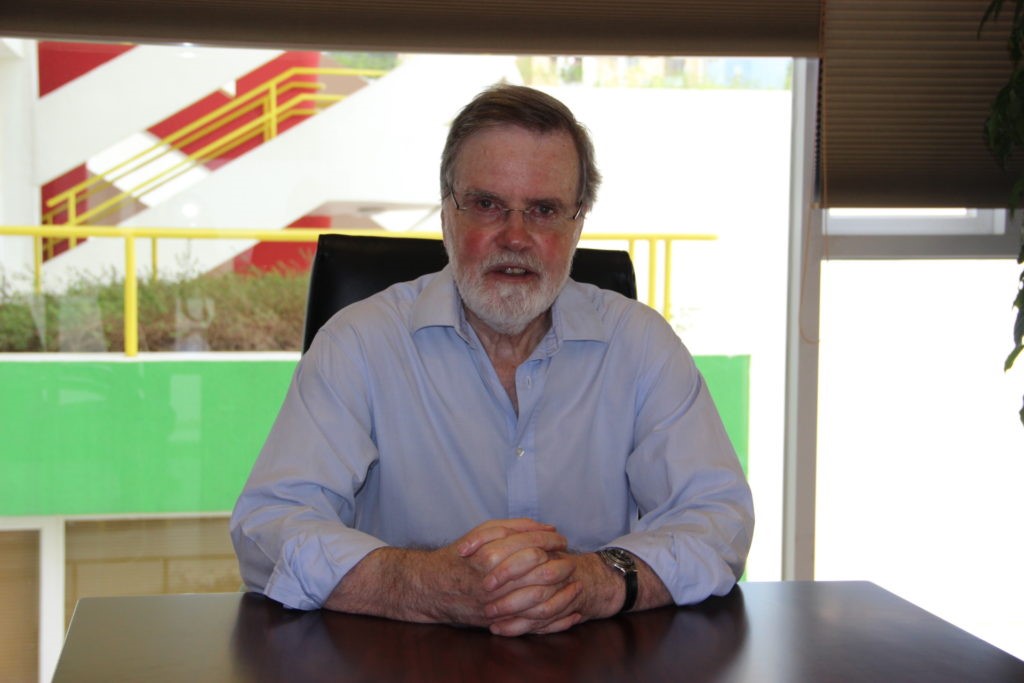– Pedro Daniel Oliveira
A bachelor’s degree in Digital Cinema and a master’s in History and Heritage are two new courses that University of Saint Joseph is offering, its Rector Fr Peter Stilwell told O CLARIM. He also talked about the territory’s demographic problem affecting Higher Education, and the Great Bay Area’s opportunity which the Macau Government and local institutions should not miss.
Is USJ facing any changes regarding its structure?
We had a change in the senior management and we have a new Vice Rector. Jenny [Lao Phillips] continues as the Registrar, but she will now take on the position of Acting Dean of the School of Business. And we have a new Vice Rector who’s joining us. He’s Professor Keith Morrison. He’s a specialist in quality assurance. He used to be Professor here at USJ many years ago, and he left, and went to MUST [Macau University for Science and Technology.]
How about the courses?
We have the same courses as usual. And we have something new. We have the bachelor of digital cinema, which is the first in Macau. We keep our enrollments open for this bachelor. In fact, we accept students until the end of September. Regarding the master’s program we are going to have the one in History and Heritage, which for several years we haven’t opened. And now it looks like we have a number… Around ten [enrollments.]
How steady are the enrolments in bachelor’s and master’s degrees?
We have seen in the last two years, the numbers have gone up in the master’s degrees, and they are holding in some bachelor’s degrees, such as Communication and Media, Education, Social Work, and Psychology more or less… And even in the bachelor of Business Administration, it has been dropping slowly, but it’s still reasonable in numbers.
Taking into account the increase in master’s enrolments, we may say this is an assurance of quality provided by USJ…
We believe so. That is where we have been putting our effort, to improve the quality, and also that we are aware there is a demographic problem here in Macau — the dropping number of students from secondary schools for the next 10 years. We’re going to have small numbers. Taiwan and Mainland China are recruiting from Macau, and we cannot recruit from Mainland China.
Still? How are the talks?
They told us to submit a proposal.
Who?
The Liaison Office [of the Central People’s Government in Macau SAR] and GAES [Tertiary Education Services Office], they both said it’s time to try again. So, we’ll try again and see. But we cannot see and be waiting for that all the time. We think there is a demographic problem coming out of the secondary schools, but at the master’s level we are talking about a different type of population — people already working, active, and wanting to improve their CV, and after a few years working professionally they want to pursue further studies. For that unique quality, those sort of people are looking for a master’s degree, which will help them with their experience.
USJ is also betting on the organization of conferences, seminars and public lectures…
Yes. We have a conference, there’s a call for papers from the [Macau] Ricci Institute, which is working with us nowadays. That is for November. And we have the 1st China and Portuguese Speaking Countries Rector’s Forum [on October 26-27, under the theme Higher Education within the Belt and Road Initiative.] It’s a collaboration between GAES, University of Macau and us. We are inviting rectors from China and from the Portuguese-speaking countries to discuss the Greater Bay Area development regarding Higher Education. Because there’s been an indication that the Greater Bay Area should work together, not only the area of industry, but also the area of Higher Education. So, an alliance of Higher Education institutions in Hong Kong, Macau and Guangdong was set up. That is quite a number of institutions. We had [recently] a meeting in Guangzhou of the rectors, and I think given the little time — because these things take time — this is going to prove very interesting for Macau.
What’s the gain for Macau?
We have many Higher Education institutions and a very small territory. From the natural point of view, we have too many Higher Education institutions for the population we have in Macau. So, we can only make sense of that if these Higher Education institutions are high quality, and they provide the service to a wider area than just to Macau. This is one of the things that the Government has been betting on, as has been investing to see if it gets the Higher Education institutions in Macau to raise their quality, so they become attractive to a wider public.
So, do you mean the Greater Bay Area is also beneficial for Macau in terms of Education, because this territory needs to step up its game?
If it wants its Higher Educations to be just a service to the local community or to those students from Mainland China who are not able to get in a university in China, or if it is looking for something else… If it rather wants Macau to be a platform of something interesting… And it has all the conditions to do so, because it can give to Higher Education a lot of financial support. Higher Education requires financial support, but it brings a feedback, which is you get people from abroad coming to visit Macau, getting to know Macau and to know China.


 Follow
Follow


